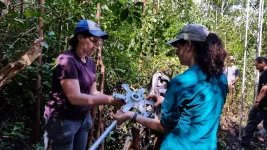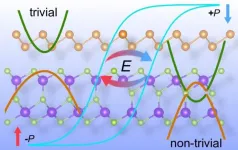(Press-News.org) Tales of post-apocalyptic landscapes in which few survivors emerge into a new and much different world have long been popular tales woven by screenwriters and authors. While many enjoy these stories, thinking of them as nothing but a guilty pleasure, they may not realize that immersing themselves in fiction has prepared them for the reality of 2020, according to a team of researchers.
John Johnson, professor emeritus of psychology at Penn State, recently conducted research with several colleagues revealing that an individual's enjoyment of horror films could have better prepared them for the COVID-19 pandemic as opposed to others who do not enjoy frightening entertainment. Their findings are documented in Personality and Individual Differences.
"My latest research collaboration was unique in that my colleagues wanted to identify factors beyond personality that contributed to people's psychological preparedness and resilience in the face of the pandemic," Johnson explained. "After factoring out personality influences, which were actually quite strong, we found that the more movies about zombies, alien invasions and apocalyptic pandemics people had seen prior to COVID-19, the better they dealt with the actual, current pandemic. These kinds of movies apparently serve as mental rehearsal for actual events.
To me, this implicates an even more important message about stories in general -- whether in books, movies or plays. Stories are not just entertainment, but preparation for life."
Johnson said that in what might be considered retirement, his emeritus status has allowed him to continue to be engaged in the research projects of his choosing, while also helping other researchers along the way.
"Now that I am retired, I have all the time in the world and the freedom to choose any kind of research project that I find truly interesting," said Johnson. "Many of my most recent projects began at the invitation of other researchers who hoped that I could lend my expertise to these projects. Most of these researchers are just beginning their careers, so in a way, I am teaching and mentoring them as well as helping them conduct their research."
Johnson's impact on personality research continues to be felt even in retirement, as young researchers and longtime colleagues still reach out to draw on his expertise.
"This study was conceived by a graduate student in human development and biology at the University of Chicago, Coltan Scrivner," Johnson said. "I had recently reviewed a terrific paper he wrote on morbid curiosity, so I knew who he was. Coltan conducts research on the psychology of horror, and therefore contacted two Danish researchers who were experts on horror, Mathias Clausen and Jens Kjeldgaard-Christiansen, to see if they would collaborate with him. I had previously conducted and published research with Mathias and Jens on what attracts people to horror and villains, so they invited me to the project. We all had input; mine was primarily on how to measure personality, preparedness and resilience, and how to conduct the statistics. Coltan collected the data online, and we quickly wrote up the results and submitted to a journal that was looking for studies on COVID-19. It has been an absolute joy to work with the Danish research team and their colleagues."
The researchers designed a survey they pilot-tested. They administered the final survey to 310 persons via a website. Thirteen items in the survey assessed positive and negative resilience. A set of six questions covered preparedness for the pandemic.
Participants then indicated the extent to which they were fans of horror, zombie, psychological thriller, supernatural, apocalyptic/post-apocalyptic, science fiction, alien-invasion, crime, comedy, and romance genres in movies and television. Next, participants were asked about the past and present experience with and interest in films that were explicitly about pandemics. Other questions appeared in the survey for other projects and as controls.
The results of their collaborated effort may be enough to make many feel justified in staying up late to watch horror films, in spite of what their mothers told them.
"What we found was that people who watched certain kinds of movies before the pandemic seemed to be helped by them during the pandemic," Johnson said.
Though, for those ready to fire up Netflix and get their horror fix now, they may be late to the party in preparing for the COVID pandemic. But, as Johnson explained, it is never too late to make ready for the next hurdle in life.
"I'm not sure that watching such movies now would be helpful for our current situation," he said. "However, my understanding of pandemics and other life-challenging events is that similar future challenges are absolutely inevitable. The past is often forgotten too easily. Who remembered the Spanish flu epidemic until scientists brought up that piece of history during COVID-19? This reinforces my belief that consuming stories from books, films and maybe even video games is not just an idle pastime, but a way for us to imagine simulated realities that help prepare us for future challenges."
Idle pastimes are not something easily understood by an individual with Johnson's passion, and his continued efforts beyond his teaching days highlight that.
"I think that a lot of people assume that when professors retire with emeritus rank, they spend all of their time traveling, pursuing hobbies, or just relaxing at home," said Johnson. "Although I have certainly done those things since I retired, I have also continued to conduct research and publish articles, often collaborating with younger researchers who need my expertise in personality measurement."
INFORMATION:
The first-ever study of the levels of the stress hormone cortisol in the saliva of newborn white-tailed deer fawns yielded thought-provoking results that have Penn State researchers suggesting predation is not the only thing in the wild killing fawns.
"We think the hormone offers a way to evaluate factors in the environment that affect fawns, such as disease, but are difficult to evaluate when just looking at a carcass that has been picked over by predators," said researcher Duane Diefenbach, adjunct professor of wildlife ecology. "By then, it's impossible to be certain what ...
University of Wyoming researchers headed a study that shows nonnative birds in Oahu, Hawaii, have taken over the role of seed dispersal networks on the island, with most of the seeds coming from nonnative plants.
"Hawaii is one of the most altered ecosystems in the world, and we are lucky enough to examine how these nonnative-dominated communities alter important processes, such as seed dispersal," says Corey Tarwater, an assistant professor in the UW Department of Zoology and Physiology. "What we have found is that not only do nonnative species dominate species ...
Boston, Mass. - As the number of COVID-19 infections continues to rise nationwide, more than 360,000 Americans have already died from the potentially deadly viral infection. But recent reports describe an increase in mortality during the pandemic that cannot be explained by COVID-19 deaths alone.
In a new study from the Richard A. and Susan F. Smith Center for Outcomes Research in Cardiology at Beth Israel Deaconess Medical Center (BIDMC), researchers analyzed data from the National Center for Health Statistics to compare the rate of cardiovascular-related deaths before and after the onset of the pandemic in ...
Mindfulness courses can reduce anxiety, depression and stress and increase mental wellbeing within most but not all non-clinical settings, say a team of researchers at the University of Cambridge. They also found that mindfulness may be no better than other practices aimed at improving mental health and wellbeing.
Mindfulness is typically defined as 'the awareness that emerges through paying attention on purpose, in the present moment, and nonjudgmentally to the unfolding of experience moment by moment'. It has become increasingly popular in recent years as a way of increasing wellbeing and ...
Deaths from ischemic heart disease and hypertensive diseases in the United States increased during the COVID-19 pandemic over the prior year, while globally, COVID-19 was associated with significant disruptions in cardiovascular disease testing. These findings are from two papers publishing in the Journal of the American College of Cardiology that examined the indirect effects of the pandemic on cardiovascular disease patients and their care.
The impact of the COVID-19 pandemic has been substantial, but there are concerns about the indirect impact of the pandemic as well, particularly for heart disease patients. Many reports have suggested that large mortality increases during the pandemic cannot be explained by COVID-19 alone. During the height of stay-at-home orders in the U.S., hospitals ...
HOUSTON - (Jan. 11, 2021) - An atypical two-dimensional sandwich has the tasty part on the outside for scientists and engineers developing multifunctional nanodevices.
An atom-thin layer of semiconductor antimony paired with ferroelectric indium selenide would display unique properties depending on the side and polarization by an external electric field.
The field could be used to stabilize indium selenide's polarization, a long-sought property that tends to be wrecked by internal fields in materials like perovskites but would be highly useful for solar energy applications.
Calculations by Rice materials theorist Boris Yakobson, lead author and researcher Jun-Jie Zhang and graduate student Dongyang Zhu shows switching the material's polarization with an external electric field makes ...
MDC researchers have developed a new approach to CAR T-cell therapy. The team has shown in Nature Communications that the procedure is very effective, especially when it comes to fighting follicular lymphomas and chronic lymphocytic leukemia, the most common type of blood cancer in adults.
The body's defense system generally does not recognize cancer cells as dangerous. To correct this sometimes fatal error, researchers are investigating a clever new idea, one that involves taking a handful of immune cells from cancer patients and "upgrading" them in the laboratory so that they recognize certain surface proteins in the malignant cells. The researchers then multiply ...
Stress on an expectant mother could affect her baby's chance of developing disease - perhaps even over the course of the child's life, UC researchers have found.
Psychosocial factors creating stress -- such as lack of social support, loneliness, marriage status or bereavement -- may be mutating their child's mitochondrial DNA and could be a precursor to a host of diseases, according to a University of Cincinnati study.
"There are a lot of conditions that start in childhood that have ties to mitochondrial dysfunction including asthma, obesity, attention deficit hyperactivity ...
BUFFALO, N.Y. -- University at Buffalo researchers are reporting an advancement of a chemical sensing chip that could lead to handheld devices that detect trace chemicals -- everything from illicit drugs to pollution -- as quickly as a breathalyzer identifies alcohol.
The chip, which also may have uses in food safety monitoring, anti-counterfeiting and other fields where trace chemicals are analyzed, is described in a study that appears on the cover of the Dec. 17 edition of the journal Advanced Optical Materials.
"There is a great need for portable and cost-effective chemical sensors ...
Pregnant women who exercise more during the first trimester of pregnancy may have a lower risk of developing gestational diabetes, according to a new study led by Samantha Ehrlich, an assistant professor in the Department of Public Health at the University of Tennessee, Knoxville, and adjunct investigator with the Kaiser Permanente Division of Research. The analysis found that lower risk was associated with at least 38 minutes of moderate intensity exercise each day--a bit more than current recommendations of at least 30 minutes a day five days a week.
Gestational diabetes refers to diabetes diagnosed for the first time during pregnancy. It can pose serious health problems including pregnancy and delivery complications as well as increased future risk for diabetes ...






